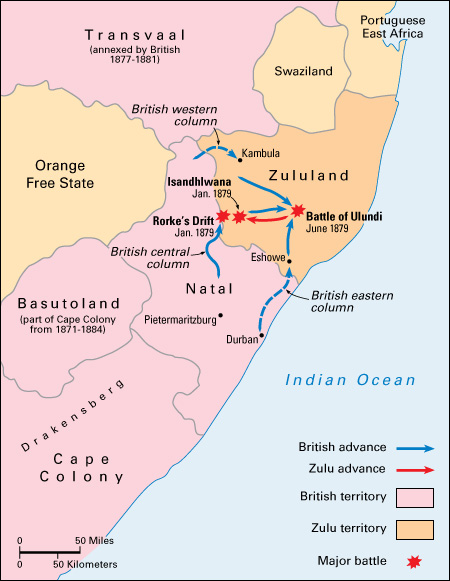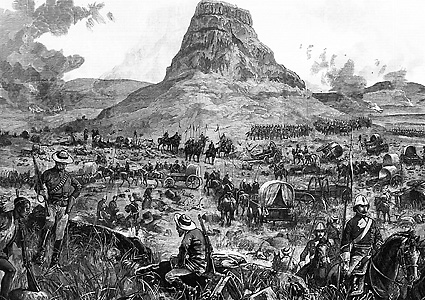Anglo-Zulu War took place in South Africa in 1879. Most historians agree that the United Kingdom started the war to break the independence of the Zulu people. Lord Carnarvon, the British colonial secretary, wanted to crush Zulu power so that the United Kingdom could combine the separate South African states into a strong federation.
The Anglo-Zulu War was a short, minor war, but it had enormous effects both in South Africa and throughout the British Empire because the United Kingdom lost several battles. These blows to the British military reputation were viewed with keen interest in Europe, where some states hoped to challenge the power of the British Empire.
In the 1870’s, Cetshwayo reigned as king of the Zulu. He tried to maintain peaceful relations with his neighbors but he was determined to restore the self-respect and esteem of his people. He possessed a powerful army capable of protecting his kingdom.
After the United Kingdom annexed (occupied) the Transvaal in 1877, the British were concerned about an independent Zulu kingdom on the Transvaal’s border. Cetshwayo disputed the new boundary, and a colonial boundary commission supported his claims. But the British high commissioner, Sir Bartle Frere, was determined to destroy Zulu power. In 1878, after missionaries complained about Zulu customs and practices, Frere demanded that Cetshwayo agree to conditions that meant effectively giving up Zulu independence. As Cetshwayo attempted to meet most of the demands, British troops advanced to the Zulu borders. They intended to launch a three-pronged attack on Ulundi, the Zulu capital.

In the British colony of Natal, supporters of Cetshwayo tried in vain to stop the impending clash. But in January 1879, British forces crossed into Zululand. The eastern column was stopped at Eshowe. The central column suffered enormous casualties at Isandhlwana, and the western column was bogged down at Kambula.

The defeated British troops retreated to Natal to regroup and call for reinforcements. Panic-stricken settlers in Natal and the Transvaal built up their defenses. The British government expressed shock and dismay at both the invasion of Zululand and the loss of men and equipment. The commander of the British forces, Lord Chelmsford, was determined to restore his reputation. He launched a second attack in June 1879. Cetshwayo had hoped to negotiate a peace treaty with the British, especially because his people had not been able to harvest their crops. But in June 1879, the Zulu army was defeated in the Battle of Ulundi, and Cetshwayo fled.
Cetshwayo was eventually captured, deposed, and exiled from his country. A settlement deprived the royal house of its cattle, land, and wealth, and Zululand itself was split up into 13 chiefdoms. In 1883, the settlement broke down, and Cetshwayo wielded limited power once more. He died a year later, and civil war quickly led to the destruction of the Zulu kingdom. In 1887, the United Kingdom placed the region under a protectorate and, 10 years later, annexed it to Natal.
